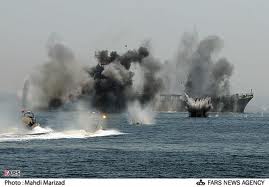
US Reports: US Fears Iran Block of Hermouz, More Troops, Secret Diplomatic Channels

Afraid of what the top US military officials described as "Iranian and other potential threats," Pentagon decided to quietly "shift combat troops and warships to the Middle East."
The US daily "Los Angele Times" reported Friday that based on the consequences of his country's defeat in Iraq, "Marine Corps Gen. James N. Mattis, who heads US Central Command, won White House approval for the deployments."
In an attempt to reduce the military effect of Washington's move, US Officials said Thursday that "the deployments are not meant to suggest a buildup to war."
"They are rather intended as a quick-reaction and contingency force in case a military crisis erupts in the standoff with Tehran over its suspected nuclear weapons program," "LAT" quoted US officials.
Uncovering that "Pentagon has stationed nearly 15,000 troops in Kuwait, including a small contingent already there," the US daily revealed that "the new deployments include two Army infantry brigades and a helicopter unit, a substantial increase in combat power after nearly a decade in which Kuwait chiefly served as a staging area for supplies and personnel heading to Iraq."
"The Pentagon also has decided to keep two aircraft carriers and their strike groups in the region," it added.
"There's enough going on in that part of the world that you can see the merit in having a robust presence," said a senior Pentagon official, speaking on condition of anonymity about military movements.
Admitting that "Iran might be able to temporarily block tanker traffic through the strait using anti-ship missiles and other weapons," US commanders claim that "they can reopen the waterway quickly if necessary."
As "LAT" reported that "US officials are divided over how much to publicize the deployments," it clarified that "US regional allies tend to dislike public discussion about their cooperation with Washington."
In the same context, "New York Times" mentioned Friday that the Obama administration is relying on a secret channel of communication to warn Iranian leaders that closing the Strait of Hormuz is a red line.
American officials indicated that the recent and delicate messages expressing concern about the Strait of Hormuz were conveyed through a channel other than the Swiss government, which the United States has often used as to relay diplomatic messages to Tehran.
The newspaper further learned that "US officials declined to describe the unusual contact between the two governments, and whether there had been an Iranian reply."
"The secret communications channel was chosen to underscore privately to Iran the depth of American concern about rising tensions over the strait, where American naval officials say their biggest fear is that an overzealous Revolutionary Guards naval captain could do something provocative on his own, setting off a larger crisis," "NYT" added.
"If you ask me what keeps me awake at night, it's the Strait of Hormuz and the business going on in the Arabian Gulf," Adm. Jonathan W. Greenert, the chief of naval operations, said in Washington this week.
US War Secretary Leon E. Panetta told troops in Texas on Thursday that "the United States would not tolerate Iran's closing of the strait."
"The simple answer is yes, they can block it," General Dempsey said on CBS on Sunday.
Quoting an unclassified report by the Office of Naval Intelligence, the American Navy's intelligence arm the paper stated that "Iran's credible mining threat can be an effective deterrent to potential enemy forces."
According to "NYT", "analysts said American naval forces might encounter layers of simultaneous attacks."
"The Iranians could launch anti-ship missiles from their coastline, islands or oil platforms and at the same time surround any American ship with missile-armed speedboats," analysts fear.
Source: LAT- NYT, Edited by moqawama.org



